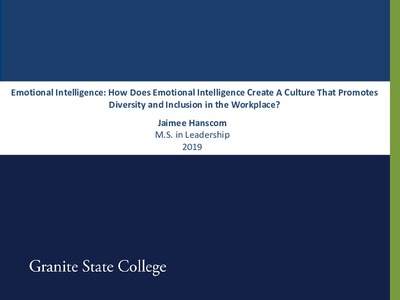| dc.description | Scholars and practitioners alike have studied and applied the principles of emotional intelligence (EI) and diversity in leadership and organizational performance extensively in the past decade. This research examined two models of emotional intelligence including the Salovey and Mayer Four Branch Model and Dan Goleman’s four key elements to emotional intelligence. The literature review demonstrated how emotional intelligence within an organization can create a work culture that supports inclusion and diversity while focusing on the advantage components of EI such as self-awareness, self-management, social awareness and relationship management and the impact it can have on personal and organizational performance and achievements. Further research investigates a case study of Emotional Intelligence for People-First Leadership at FedEx Express where the company integrates emotional intelligence assessment and development into a six-month training process for new managers world-wide. The quantitative and qualitative data show significant increases in several areas assessed, especially in areas concerning decision making, quality of life, and influence. The research will help readers to recognize how developing the capacity to understand and manage their own feelings as well as the feelings of others, no matter how great the differences, is a critical competence that is vital to the success of an individual and the success of an organization. | |


